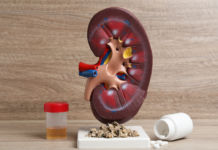Sponsored by: Renadyl
Healthy kidneys clean the blood 24/7. During each minute of every day, around one quart (1000ml) of blood passes through the kidney. Considering its small size, this is a huge amount of blood, much more than is received by any other organ in the body. The total blood volume of an adult is around 5-7 quarts, so it takes only minutes for one’s entire blood supply to pass through the kidney, and more and more of the body’s wastes are cleared from the blood.
The artificial dialyzer is similar to the kidney. Again, as more blood passes through the dialyzer, cleaning increases, and more wastes are removed. The key to the success of both the kidney and the dialyzer is receiving a good blood flow.
How good is the blood flow to your dialyzer? Do you know how much blood passes through your dialyzer in one treatment? If you are not sure, ask your kidney doctor. This number is usually given on the dialysis machine and is dependent on two factors: (1) the blood flow rate (your pump speed) and (2) the length of your treatment. If, for example, your blood pump speed is 400ml/minute and you dialyze for four hours, about 96,000ml (24 gallons) of blood will pass through the dialyzer each treatment. Or, if you dialyze for four hours, but the flow from your access is only 300ml/min, as is more common with catheters, then about 72,000l (18 gallons) of blood would be cleaned during treatment, or one-third less than in the first example.
An increase in waste leads to a lack of energy, poor appetite, itching, and hospitalizations. While a decrease in waste promotes health and wellness. The more blood is cleaned by the dialyzer, the more removal of wastes will occur, and the better the Kt/V reading will be.
Factors that will lower the Kt/V include:
- Poor blood flow the access (e.g. from underdeveloped access, from a catheter, or small gauge needles)
- Shortened treatment time
- Clots in the dialyzer
- Access recirculation (due to a stenosis/stricture)
Both well-functioning access and sufficient treatment time will help assure a large volume of your blood is cleaned each treatment. If you have any questions about your blood flow, talk with your kidney doctor.
About the author
Steven Belcher, RN, MSN, MS, is a dedicated kidney advocate who began his journey 20 years ago as a dialysis nurse. This job inspired him to help as many people with kidney disease as he could. Not only did he spend two decades caring for a patient’s physical and emotional needs in a clinical setting, but he also educated the public on the risk factors of kidney disease. Some of his many philanthropic successes include being a keynote speaker at the National Association of Nephrology Technicians/ Technologists (NANT), presenting at community spaces, and launching radio shows.
He now focuses his time entirely on his organization Urban Kidney Alliance, which educates the public about kidney disease. His goal? To lower rates of Chronic Kidney Disease in urban communities in Baltimore, Maryland, across the country, and globally through education and collaboration.
Steve has also written the book “HOW TO SURVIVE OUTPATIENT HEMODIALYSIS: A GUIDE FOR PATIENTS WITH KIDNEY FAILURE.” You can read the book review here.
Learn more about our sponsor Renadyl here https://bit.ly/3sZDWbb
*These statements have not been evaluated by the US Food and Drug Administration. This information is not intended to diagnose, treat, cure, or prevent any disease. Always consult with a qualified healthcare professional prior to beginning any diet or exercise program or taking any dietary supplement. The content on our website is for informational and educational purposes only.




